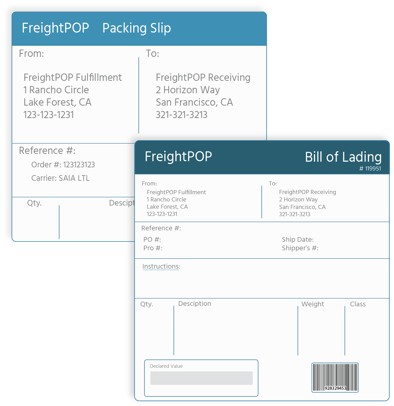It's time to get control of your Shipping POs
Most transportation management systems for small/medium-sized businesses do not offer PO management on inbound orders from suppliers and vendors,...

A Bill of Lading, or BOL, is a legal form that a shipper must fill out before the shipping process can begin. It is a legally binding document that can be used in legal disputes between a shipper and carrier, so it is very important to fill in the form as accurately and completely as possible.
A BOL has three specific functions:
The Federal Motor Carrier Safety Administration (FMCSA) provides the regulations for interstate and foreign transport. For BOL regulations on intrastate (same-state) transport, you would need to refer to the state transport governing body you are shipping within, however most states have similar requirements to FMCSA.
This is a non-transferable type whereby the consignee (the intended recipient) is the only person that can sign and accept the shipment
This is a shipment between companies where the expectations of an original bill of lading are more relaxed. This is also known as an “express release”.
These are BOLs used for air transportation only.
This type acts like a check, with the document being consigned to a company or shipper. Replacing this type of BOL is a difficult process and those carrying it are strongly encouraged not to misplace the document.
This type puts responsibility of the shipment on the carrier from pick up to the drop off port. In this instance the BOL will not specify the specific destination, only the destination port. This type is sometimes referred to as an “ocean bill of lading”.
This type is covers multiple transportation points, with the carrier responsible for the safe transport at every stage. This is often referred to as a multimodal transport bill of lading.
This type also covers multiple transportation points, however the onus of safe delivery to the final destination is not on the carrier. The carrier is only responsible for the sea and port transportation.
These refer to BOLs that are forged or inaccurate on the description of cargo or other information. Usually these occur when an individual or entity forge the signature of the intended consignee.
 The BOL is the first document shippers and carriers refer to when something goes wrong. The BOL is the document freight and cargo inspectors refer to when determining if the shipment is in compliance. And as mentioned, the BOL is a legally binding document. Thousands of dollars could be on the line in a given shipment, so accuracy is paramount.
The BOL is the first document shippers and carriers refer to when something goes wrong. The BOL is the document freight and cargo inspectors refer to when determining if the shipment is in compliance. And as mentioned, the BOL is a legally binding document. Thousands of dollars could be on the line in a given shipment, so accuracy is paramount.
The shipper should make sure all the information on the form is correct and legible before signing and sending out the shipment. This includes making sure the proper NMFC classification is noted. If a discrepancy is found between the listed class on the BOL and what the actual freight is, a reclassification can occur with costly fees applied. (Please see our post NMFC Codes for Freight Classification for more information).
Training your shipping and receiving staff on the importance of accuracy and employing audits to hold staff accountable is a best practice tip. It is also a good idea to use one standard BOL form. There are a number of versions on the internet and sticking to one form will help standardize the process for your shipping team.
A Transportation Management System (TMS) is an invaluable tool in managing BOLs and many other shipping processes, from obtaining quotes to tracking customer shipments. A good TMS will allow you to print BOLs directly from your orders clearly and with less chance of human error than filling out forms by hand.
For more shipping tips, check out our eBook bundle covering carrier rate shopping, digitizing supply chains, tracking and reporting, and parcel & freight auditing!

Most transportation management systems for small/medium-sized businesses do not offer PO management on inbound orders from suppliers and vendors,...

CUSTOMER SPOTLIGHT: Learn how a national supplier with 15 locations used FreightPOP's integrations and software to digitize their logistics.

Could implementing a zone skipping tool give you a competitive advantage come 2026? We asked fulfillment, retail, and 3PL experts for their...